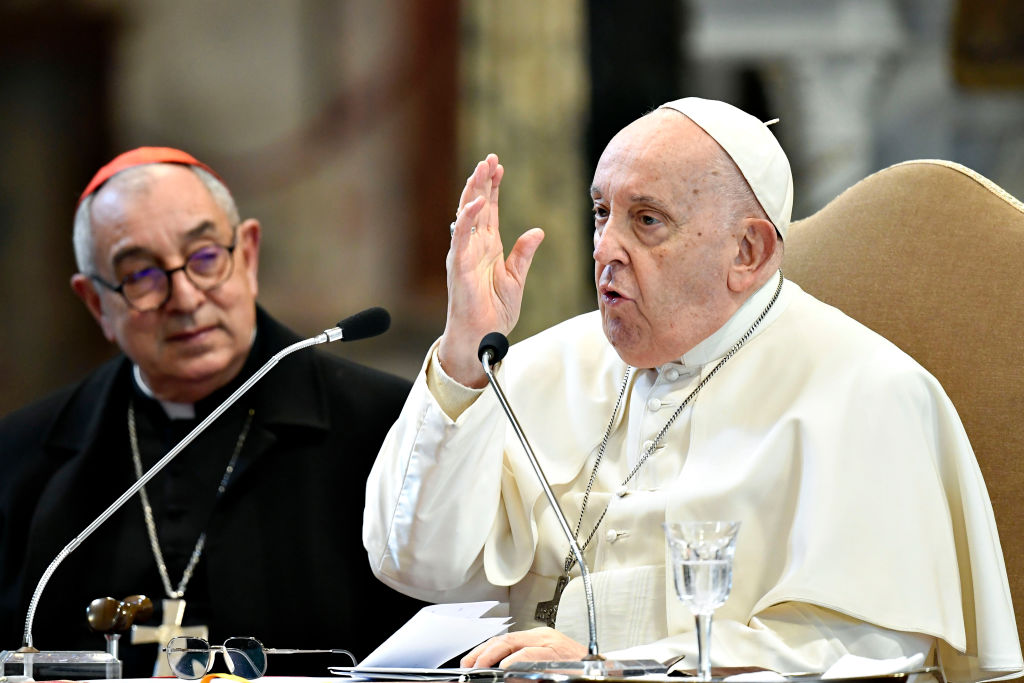Don’t fall for the lies of the postmodern Left.
The Delusions of Postcolonial Ideology

Caricatures and lies abound in the attempt to subvert the West.
“Come, fix me upon me that accusing eye. I thirst for accusation.” – W.B. Yeats
Thus began the seminal 1976 article, “Western Guilt & Third World Poverty,” first published in Commentary by the great developmental economist P.T. Bauer and then reproduced in an expanded version in his 1981 book Equality, the Third World, and Economic Delusion. That book was published by Harvard University Press, something that could not happen today. Bauer, a refugee from Hungary and a professor for many decades at the London School of Economics, was the scourge of “postcolonial discourse” well before it received a name and became a suffocating orthodoxy in Western academic and intellectual circles. He remains among the surest guides to thinking seriously about questions that are now dominated by ideological clichés with little or no basis in fact.
In his essay, Bauer pointed out that “the poorest and most backward countries have until recently had no external economic contacts and often have never been Western colonies.” He took aim at the widespread sophistry that the prosperity of Western democracies depended upon the past and present exploitation of various African, Asian, and Latin American colonies and dependencies. Responding to a typical argument excoriating the British for taking “the rubber from Malaya, the tea from India, [and] raw materials from all over the world” and giving “almost nothing in return,” Bauer pointed out the inconvenient truth that the British “took the rubber to Malaya and the tea to India.”
Truth be told, before the Western presence in these countries, there was little or no “wealth to be drained.” Famines occurred quite frequently in countries that had no significant political or economic contact with Western countries. While untold numbers of intellectuals, academics, and activists specialize, then and now, in blaming the West for Third World poverty in its various forms, Bauer highlighted a truth far more ignored than acknowledged:
So far from condemning Third World people to death, Western contacts have been behind the large increase in life expectation in the Third World, so often deplored as the population explosion by the same critics.
Bauer admired the ability of ordinary people to better their lot and to live in dignity when common sense, the rule of law, and economic sanity prevailed in developing countries. He cheered the success of the “Asian Tigers” (e.g., Taiwan, Singapore, South Korea, and pre-1997 Hong Kong) whose remarkable economic and political transformations disproved the radical pessimism and insistent nihilism of para-Marxist “dependency theory.” Quite simply, the success of these countries had nothing to do with cutting themselves off from international markets or private enterprise and economic competition.
In contrast, African and Latin American leaders who took their bearings from fashionable Western theories rooted in guilt and collectivist assumptions brought tyranny and penury to their countries. The then-famous and fashionable Kwame Nkrumah impoverished the once prosperous Gold Coast (now Ghana). Countless tyrants and demagogues such as Robert Mugabe in Zimbabwe and the Marxist-Leninist Mengistu Haile Mariam in Ethiopia rapidly undid what progress had been made in their respective countries.
And how strange it is that apologists for the communist dictatorship in Cuba blame that country’s self-induced problems—in 1959 it was the fourth most prosperous country in the Americas with a thriving middle class—on an American economic embargo that has kept that island from being a full participant in capitalist world markets. Even Cuba’s communist tyrants know that socialist autarky (or self-sufficiency) is in truth an invitation to disaster.
Bauer highlights how the West opened up much of the Third World to the invigorating presence of the Chinese, Indians, and Levantines. These entrepreneurs and economic middlemen who thrived outside their own countries were sources of economic dynamism, vitality, and prosperity. When Third World tyrants turned on them, as the murderous and insane Idi Amin did in Uganda in 1973, calamity almost immediately ensued.
P.T. Bauer also appreciated how remarkably immune to evidence postcolonial ideology turned out to be. As the West became more prosperous after abandoning the various European empires—English, French, Dutch, and Belgian—ideologues took aim at an allegedly ubiquitous network of “neo-colonialism.” Contact with the West was said to be the source of almost all evils, and local tyrants and self-aggrandizing and corrupt elites were given a free pass when not celebrated as “liberators” and “freedom fighters.”
In contrast, Bauer placed blame on the West for entirely different reasons. To be sure, empire and colonialism were not without moral and political fault. But in the decades during and after decolonialization, the “development” policies of Western elites and international organizations served to “politicize economic life in the Third World.” “A ready-made framework for state-controlled economies or even for totalitarian states was presented to the incoming governments,” Bauer notes.
Corruption on a mass scale was an inevitable byproduct of replacing limited government under British colonial rule with statist regimes and elites unscrupulously fighting over the trough created by Western aid. Discrimination and persecution of successful ethnic minorities allowed corrupt and despotic governments to curry favor with the disempowered population at large. The ill-advised efforts of Western guilt thus paradoxically benefited kleptocratic elites and hurt those individuals and groups struggling to improve their lot in life through hard work, acquired skills, and enterprise rather than unscrupulously raiding the political and economic commons.
Finally, Bauer appreciated just how much postcolonial ideology drew on pathological Western self-loathing, a debilitating guilt that undermined the moral legitimacy of Western civilization, while doing immense damage to the prospects of the countries relegated to the so-called Third World. In all these ways, his groundbreaking work helps us today better appreciate how many of the regnant assumptions about colonialism, Western guilt, and Third World “oppression” and poverty exist in a fact-free zone.
This becomes even more apparent through a reading of Thomas Sowell’s encyclopedic Conquests and Cultures. With his typical mixture of empiricism and good sense, Sowell demonstrates just how ubiquitous war, conquests, and slavery have been in the human experience. To see these as monopolies of a uniquely oppressive and culpable West is simply absurd.
Without cultural “appropriation” and the ongoing interpenetration of peoples, the experience of human beings would be terribly impoverished, as Sowell’s opening discussion of the shaping of British character, history, politics, and economics throughout the ages makes abundantly clear. Sowell is perfectly upfront about the West’s own crimes and misdeeds, as any honest scholar and citizen ought to be. But he also tells the story of the 18 million victims of the cruel Islamic slave trade with its mountain of cadavers, eunuchs, and a marked condescension (or worse) toward all things African.
Sowell passes over neither the crimes of the conquistadors nor the human sacrifices and cannibalism of the Aztecs and the cruel despotism of the Incans. There were many predations committed by colonizers in Spanish America. But there were also numerous popes who denounced the cruelties and iniquities of slavery and the slave trade. Men like the Spanish priest Bartolemé de las Casas fiercely denounced injustices against native peoples and pleaded for the cause of common humanity.
In England, inspired by the dual legacies of Christianity and the mutually reinforcing doctrines of natural rights and law, public opinion turned dramatically against slavery. After 1833 and for most of the nineteenth century, the British navy became one of the great global instruments for expanding human rights through extirpating the slave trade. It did so with zeal and efficiency.
What stands out, despite everything, is the West’s salutary capacity for self-criticism and self-correction, traits far from abundant in the rest of the world.
“Enough of pesky facts!” the angry moralists and ideologues will cry. What of “systemic injustice” and the “intrinsic evil” of one people ruling another people against their will? In the third and final installment of this series, we will turn to Colonialism, the recent book by the Oxford theologian Nigel Biggar, who provides a model of moral seriousness on this most contested of issues. With his help, and that of others, we will also show that postcolonial ideology is itself very much in need of a moral reckoning. As the French social theorist René Girard argued at the end of his life, untold damage has been done to moral judgment and political prudence by a “caricatural ‘ultra-Christianity’ that tries to escape from the Judeo-Christian orbit by ‘radicalizing’ the concerns for victims in an anti-Christian manner.”
Whatever happened, we will ask, to a sober recognition of original sin, shared moral accountability, and “turning the sword inward” before doing so outward? There lies the real thing, Christian realism, and not its pernicious caricature, postcolonial ideology. We will also show that moral judgment must be based in a scrupulous attentiveness to empirical realities and to the wellsprings of human nature. Otherwise, it becomes mere sentimentality, at best, or, at worst, a weapon in the hands of extremists and ideologues.
The American Mind presents a range of perspectives. Views are writers’ own and do not necessarily represent those of The Claremont Institute.
The American Mind is a publication of the Claremont Institute, a non-profit 501(c)(3) organization, dedicated to restoring the principles of the American Founding to their rightful, preeminent authority in our national life. Interested in supporting our work? Gifts to the Claremont Institute are tax-deductible.
A society that teaches its children to despise their elders will collapse.
Rage meets self-pity as the permanently offended root out false thought.
Our dark hour calls for a recovery of the statesman’s virtues.
Moralism, utopianism, and denunciations of all things Russian are not the answer in the present fight.
Pope Francis’s dalliance with a tyrannical ideology needs to be confronted.






